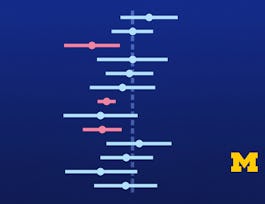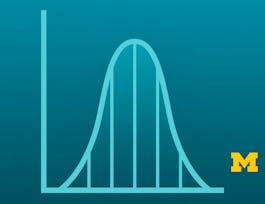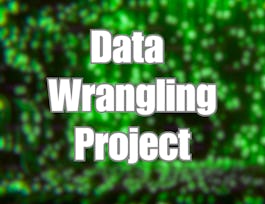In this course, we will expand our exploration of statistical inference techniques by focusing on the science and art of fitting statistical models to data. We will build on the concepts presented in the Statistical Inference course (Course 2) to emphasize the importance of connecting research questions to our data analysis methods. We will also focus on various modeling objectives, including making inference about relationships between variables and generating predictions for future observations.


Fitting Statistical Models to Data with Python
This course is part of Statistics with Python Specialization
Taught in English
Some content may not be translated



Instructors: Brenda Gunderson
33,509 already enrolled
Included with 
Course
(674 reviews)
87%
Recommended experience
What you'll learn
Deepen your understanding of statistical inference techniques by mastering the art of fitting statistical models to data.
Connect research questions with data analysis methods, emphasizing objectives, relationships between variables, and making predictions.
Explore various statistical modeling techniques like linear regression, logistic regression, and Bayesian inference using real data sets.
Work through hands-on case studies in Python with libraries like Statsmodels, Pandas, and Seaborn in the Jupyter Notebook environment.
Details to know

Add to your LinkedIn profile
7 quizzes
Course
(674 reviews)
87%
Recommended experience
See how employees at top companies are mastering in-demand skills

Build your subject-matter expertise
- Learn new concepts from industry experts
- Gain a foundational understanding of a subject or tool
- Develop job-relevant skills with hands-on projects
- Earn a shareable career certificate


Earn a career certificate
Add this credential to your LinkedIn profile, resume, or CV
Share it on social media and in your performance review

There are 4 modules in this course
We begin this third course of the Statistics with Python specialization with an overview of what is meant by “fitting statistical models to data.” In this first week, we will introduce key model fitting concepts, including the distinction between dependent and independent variables, how to account for study designs when fitting models, assessing the quality of model fit, exploring how different types of variables are handled in statistical modeling, and clearly defining the objectives of fitting models.
What's included
8 videos6 readings1 quiz2 ungraded labs
In this second week, we’ll introduce you to the basics of two types of regression: linear regression and logistic regression. You’ll get the chance to think about how to fit models, how to assess how well those models fit, and to consider how to interpret those models in the context of the data. You’ll also learn how to implement those models within Python.
What's included
5 videos4 readings3 quizzes3 ungraded labs
In the third week of this course, we will be building upon the modeling concepts discussed in Week 2. Multilevel and marginal models will be our main topic of discussion, as these models enable researchers to account for dependencies in variables of interest introduced by study designs. We’ll be covering why and when we fit these alternative models, likelihood ratio tests, as well as fixed effects and their interpretations.
What's included
7 videos3 readings2 quizzes4 ungraded labs
In this final week, we introduce special topics that extend the curriculum from previous weeks and courses further. We will cover a broad range of topics such as various types of dependent variables, exploring sampling methods and whether or not to use survey weights when fitting models, and in-depth case studies utilizing Bayesian techniques to derive insights from data. You’ll also have the opportunity to apply Bayesian techniques in Python.
What's included
6 videos4 readings1 quiz1 discussion prompt1 ungraded lab
Instructors

Offered by
Recommended if you're interested in Probability and Statistics

University of Michigan

Universitat Autònoma de Barcelona

University of Michigan

University of Colorado Boulder
Why people choose Coursera for their career




Learner reviews
Showing 3 of 674
674 reviews
- 5 stars
65.87%
- 4 stars
20.02%
- 3 stars
8.01%
- 2 stars
3.41%
- 1 star
2.67%
New to Probability and Statistics? Start here.

Open new doors with Coursera Plus
Unlimited access to 7,000+ world-class courses, hands-on projects, and job-ready certificate programs - all included in your subscription
Advance your career with an online degree
Earn a degree from world-class universities - 100% online
Join over 3,400 global companies that choose Coursera for Business
Upskill your employees to excel in the digital economy
Frequently asked questions
Access to lectures and assignments depends on your type of enrollment. If you take a course in audit mode, you will be able to see most course materials for free. To access graded assignments and to earn a Certificate, you will need to purchase the Certificate experience, during or after your audit. If you don't see the audit option:
The course may not offer an audit option. You can try a Free Trial instead, or apply for Financial Aid.
The course may offer 'Full Course, No Certificate' instead. This option lets you see all course materials, submit required assessments, and get a final grade. This also means that you will not be able to purchase a Certificate experience.
When you enroll in the course, you get access to all of the courses in the Specialization, and you earn a certificate when you complete the work. Your electronic Certificate will be added to your Accomplishments page - from there, you can print your Certificate or add it to your LinkedIn profile. If you only want to read and view the course content, you can audit the course for free.
If you subscribed, you get a 7-day free trial during which you can cancel at no penalty. After that, we don’t give refunds, but you can cancel your subscription at any time. See our full refund policy.

